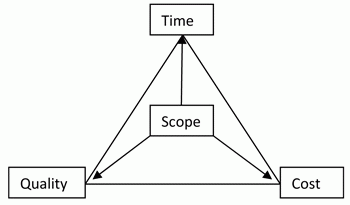What is Project Management?

What is a Project?
A project is temporary in that it has a defined beginning and end in time, and therefore defined scope and resources.
And a project is unique in that it is not a routine operation, but a specific set of operations designed to accomplish a singular goal. So a project team often includes people who don’t usually work together – sometimes from different organizations and across multiple geographies. The temporary nature of projects stands in contrast with business as usual (or operations), which are repetitive, permanent, or semi-permanent functional activities to produce products or services. In practice, the management of these two systems is often quite different, and as such requires the development of distinct technical skills and management strategies.
What is Project Management?
Project management, then, is the application of knowledge, skills, tools, and techniques to project activities to meet the project requirements. The primary challenge of project management is to achieve all of the project goals within the given constraints. The primary constraints are scope, time, quality and budget.

Project management processes fall into five groups:
・ Initiating
・ Planning
・ Executing
・ Monitoring and Controlling
・ Closing
Initiating
The initiating processes determine the nature and scope of the project. If this stage is not performed well, it is unlikely that the project will be successful in meeting the business needs. The key project controls needed here are an understanding of the business environment and making sure that all necessary controls are incorporated into the project. Any deficiencies should be reported and a recommendation should be made to fix them.
The initiating stage should include a plan that encompasses the following areas:
・ analyzing the business needs / requirements in measurable goals
・ reviewing of the current operations
・ financial analysis of the costs and benefits including a budget
・ stakeholder analysis, including users, and support personnel for the project
・ project charter including costs, tasks, deliverables, and schedules
Planning
After the initiation stage, the project is planned to an appropriate level of detail. The main purpose is to plan time, cost and resources adequately to estimate the work needed and to effectively manage risk during project execution. As with the Initiation process group, a failure to adequately plan greatly reduces the project’s chances of successfully accomplishing its goals.
Project planning generally consists of
・ determining how to plan (e.g. by level of detail or Rolling wave planning);
・ developing the scope statement;
・ selecting the planning team;
・ identifying deliverables and creating the work breakdown structure;
・ identifying the activities needed to complete those deliverables and networking the activities in their logical sequence;
・ estimating the resource requirements for the activities;
・ estimating time and cost for activities;
・ developing the schedule;
・ developing the budget;
・ risk planning;
・ gaining formal approval to begin work.
Additional processes, such as planning for communications and for scope management, identifying roles and responsibilities, determining what to purchase for the project and holding a kick-off meeting are also generally advisable.
For new product development projects, conceptual design of the operation of the final product may be performed concurrent with the project planning activities, and may help to inform the planning team when identifying deliverables and planning activities.
Executing
The execution / implementation phase ensures that the project management plan’s deliverables are executed accordingly. This phase involves proper allocation, co-ordination and management of human resources and any other resources such as material and budgets. The output of this phase is the project deliverables.
Monitoring and controlling
Monitoring and controlling consists of those processes performed to observe project execution so that potential problems can be identified in a timely manner and corrective action can be taken, when necessary, to control the execution of the project. The key benefit is that project performance is observed and measured regularly to identify variances from the project management plan.
Monitoring and controlling includes:
・ Measuring the ongoing project activities (‘where we are‘);
・ Monitoring the project variables (cost, effort, scope, etc.) against the project management plan and the project performance baseline (where we should be);
・ Identifying corrective actions to address issues and risks properly (How can we get on track again);
・ Influencing the factors that could circumvent integrated change control so only approved changes are implemented.
In multi-phase projects, the monitoring and control process also provides feedback between project phases, in order to implement corrective or preventive actions to bring the project into compliance with the project management plan.
Project maintenance is an ongoing process, and it includes:
・ Continuing support of end-users
・ Correction of errors
・ Updates to the product over time
Monitoring and controlling cycle
In this stage, auditors should pay attention to how effectively and quickly user problems are resolved.
When changes are introduced to the project, the viability of the project has to be re-assessed. It is important not to lose sight of the initial goals and targets of the projects. When the changes accumulate, the forecasted result may not justify the original proposed investment in the project. Successful project management identifies these components, and tracks and monitors progress so as to stay within time and budget frames already outlined at the commencement of the project.
Closing
Closing includes the formal acceptance of the project and the ending thereof. Administrative activities include the archiving of the files and documenting lessons learned.
This phase consists of:
・ Contract closure: Complete and settle each contract (including the resolution of any open items) and close each contract applicable to the project or project phase.
・ Project close: Finalize all activities across all of the process groups to formally close the project or a project phase
Also included in this phase is the Post Implementation Review. This is a vital phase of the project for the project team to learn from experiences and apply to future projects. Normally a Post Implementation Review consists of looking at things that went well and analysing things that went badly on the project to come up with lessons learned.
Project managers
A project manager is a professional in the field of project management. Project managers can have the responsibility of the planning, execution, and closing of any project, typically relating to construction industry, engineering, architecture, computing, and telecommunications. Many other fields in production engineering, design engineering, and heavy industrial have project managers.
A project manager is the person accountable for accomplishing the stated project objectives. Key project management responsibilities include creating clear and attainable project objectives, building the project requirements, and managing the triple constraint for projects, which is cost, time, and scope.
A project manager is often a client representative and has to determine and implement the exact needs of the client, based on knowledge of the firm they are representing. The ability to adapt to the various internal procedures of the contracting party, and to form close links with the nominated representatives, is essential in ensuring that the key issues of cost, time, quality and above all, client satisfaction, can be realised.
Project management knowledge draws on ten areas:
|
Integration
|
Scope
|
Time
|
|
Cost
|
Quality
|
Procurement
|
|
Human resources
|
Communications
|
Risk management
|
|
Stakeholder management
|
|
|
All management is concerned with these, of course. But project management brings a unique focus shaped by the goals, resources and schedule of each project.
Sources:
http://www.pmi.org/About-Us/About-Us-What-is-Project-Management.aspx
https://www.apm.org.uk/WhatIsPM
https://en.wikipedia.org/wiki/Project_management
http://www.projectmanagement.org.za/
If you are interested in becoming one of our subscribers, please visit our website.
To view notes with screenshots on how to use our website, please visit our Wiki site.
To view more articles, please visit our blog.
I started working at Leads 2 Business in February 2005, and have served as Head of Department of Daily Tenders from 2007 until the present. I oversee both the Daily Tenders South Africa and Africa Departments.










